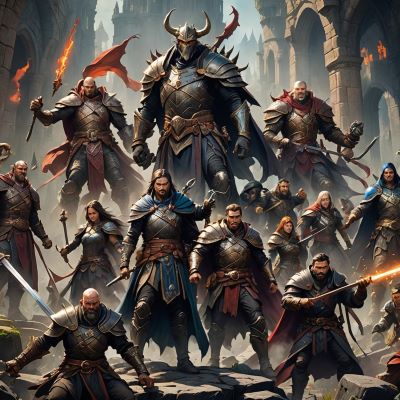Dungeons & Dragons (D&D), the iconic tabletop role-playing game, has captivated the imaginations of millions since its inception in the 1970s. While celebrated for its ability to transport players to fantastical realms filled with epic quests and heroic deeds, D&D offers much more than escapist entertainment. Beneath the layers of storytelling and strategy lie profound lessons that can be applied to everyday life. Whether you’re a seasoned adventurer or a curious newcomer, here are some of the life lessons and insights that playing D&D can give you.
Creativity and Imagination
At its core, D&D is a game of imagination. Players create characters, weave intricate backstories, and embark on adventures limited only by their creativity. This process enhances your ability to think outside the box, solve problems creatively, and envision possibilities beyond the ordinary. Whether you’re brainstorming for work or tackling personal projects, the imaginative muscles you flex during a D&D session can help you generate innovative ideas and solutions.
Teamwork and Collaboration
Successful D&D campaigns rely heavily on teamwork. Each player character (PC) brings unique skills and abilities to the table, and achieving goals often requires seamless collaboration. Players must communicate effectively, share responsibilities, and support each other to overcome challenges. These collaborative skills are directly transferable to real-life situations, such as working on group projects, leading teams, or navigating social dynamics.

Resilience and Adaptability
In D&D, things rarely go as planned. Unforeseen obstacles, unpredictable dice rolls, and the whims of the Dungeon Master (DM) can turn the tide of any adventure. Players learn to adapt quickly, think on their feet, and stay resilient in the face of adversity. This resilience is invaluable in real life, helping you cope with unexpected changes, bounce back from failures, and remain flexible in a constantly evolving world.
Strategic Thinking and Planning
Every D&D game involves a blend of strategic planning and tactical execution. Players must consider various factors—such as their character’s abilities, the environment, and potential consequences—before making decisions. This kind of strategic thinking sharpens your ability to analyze situations, plan ahead, and make informed choices, skills that are beneficial in both personal and professional contexts.
Empathy and Perspective-Taking
Role-playing different characters allows players to step into someone else’s shoes, experiencing the world from diverse perspectives. This practice fosters empathy and understanding, as you navigate the motivations, fears, and dreams of characters different from yourself. In real life, this enhanced empathy can improve your relationships, deepen your understanding of others, and promote more compassionate interactions.
Storytelling and Communication
D&D is fundamentally a shared storytelling experience. Players and the DM co-create narratives, crafting compelling stories that engage and entertain. This collaborative storytelling hones your ability to communicate effectively, both verbally and in writing. Whether you’re delivering a presentation, writing an email, or telling a story to friends, the communication skills you develop in D&D can enhance your ability to convey ideas clearly and persuasively.
Confidence and Self-Expression
Playing D&D often involves stepping out of your comfort zone, whether you’re role-playing a daring hero, speaking in character, or making bold decisions. This practice can boost your confidence and encourage you to express yourself more freely. Over time, the courage you build in the game can translate to greater self-assurance and assertiveness in real-world situations.
Ethical Decision-Making
Many D&D campaigns present moral dilemmas and complex choices that challenge players to consider their values and ethics. Navigating these scenarios helps you practice ethical decision-making, weighing the consequences of your actions and reflecting on what it means to be a good person. These life lessons in morality and ethics can guide you in making thoughtful, principled choices in your everyday life.
Final Thoughts on Life Lessons from D&D
I think you might agree that Dungeons & Dragons is more than a game. It’s a dynamic learning experience that enriches your life in unexpected ways. From fostering creativity and teamwork to building resilience and empathy, the skills you develop while adventuring in a fantasy world can have a profound impact on your real-world interactions and personal growth. So, gather your friends, roll those dice, and embark on a journey that can teach you more than you ever imagined.

